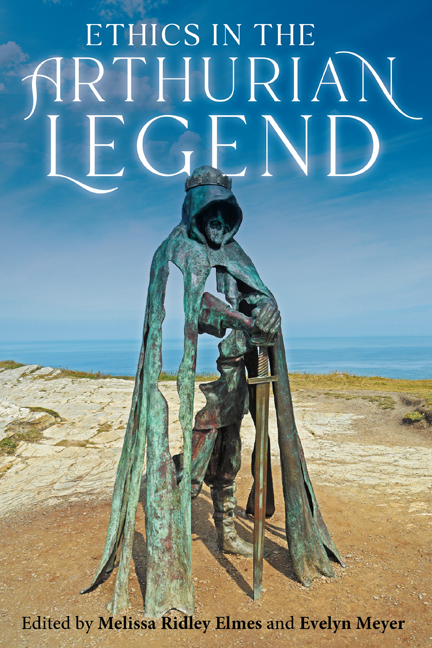Book contents
- Frontmatter
- Contents
- List of Contributors
- Foreword
- Acknowledgments
- Introduction
- 1 Arthurian Ethics before the Pentecostal Oath: In Search of Ethical Origins in Culhwch and Olwen
- 2 Too Quickly or Not Quickly Enough, Too Rash and Too Harshly: The Arthurian Court’s Lack of Ethics in Hartmann von Aue’s Erec and Iwein and Wolfram von Eschenbach’s Parzival
- 3 The Ethics of Arthurian Marriage: Husband vs Wife in Hartmann von Aue’s Iwein
- 4 Arthurian Ethics and Ethical Reading in the Perlesvaus
- 5 Translation Praxis and the Ethical Value of Chivalry in the Caligula Brut
- 6 Imperial Ambitions and the Ethics of Power: Gender, Race, and the Riddarasögur
- 7 Lowland Ethics in the Arthur of the Dutch
- 8 Contesting Royal Power: The Ethics of Good Lordship, Sir Gawain and the Green Knight, and the March of Wales
- 9 “As egir as any lyoun”: The Ethics of Knight-Horse Relationships in Lybeaus Desconus
- 10 Malory’s Ethical Dinadan: Moderate Masculinity in a Crisis of Hypermasculine Chivalry
- 11 Virtus, Vertues, and Gender: Cultivating a Chivalric Habitus in Thomas Malory’s Tale of Sir Gareth
- 12 Kingly Disguise and (Im)Perception in Three Fifteenth- Century English Romances
- 13 “Adventure? What is That?” Arthurian Ethics in/and the Games We Play
- 14 The Ethics of a New Edition of Sir Thomas Malory’s Le Morte Darthur – and More Evidence for the Superiority of the Winchester Manuscript
- 15 The Ethics of Writing Guinevere in Modern Historical Fiction
- Afterword
- Index
Foreword
Published online by Cambridge University Press: 10 January 2024
- Frontmatter
- Contents
- List of Contributors
- Foreword
- Acknowledgments
- Introduction
- 1 Arthurian Ethics before the Pentecostal Oath: In Search of Ethical Origins in Culhwch and Olwen
- 2 Too Quickly or Not Quickly Enough, Too Rash and Too Harshly: The Arthurian Court’s Lack of Ethics in Hartmann von Aue’s Erec and Iwein and Wolfram von Eschenbach’s Parzival
- 3 The Ethics of Arthurian Marriage: Husband vs Wife in Hartmann von Aue’s Iwein
- 4 Arthurian Ethics and Ethical Reading in the Perlesvaus
- 5 Translation Praxis and the Ethical Value of Chivalry in the Caligula Brut
- 6 Imperial Ambitions and the Ethics of Power: Gender, Race, and the Riddarasögur
- 7 Lowland Ethics in the Arthur of the Dutch
- 8 Contesting Royal Power: The Ethics of Good Lordship, Sir Gawain and the Green Knight, and the March of Wales
- 9 “As egir as any lyoun”: The Ethics of Knight-Horse Relationships in Lybeaus Desconus
- 10 Malory’s Ethical Dinadan: Moderate Masculinity in a Crisis of Hypermasculine Chivalry
- 11 Virtus, Vertues, and Gender: Cultivating a Chivalric Habitus in Thomas Malory’s Tale of Sir Gareth
- 12 Kingly Disguise and (Im)Perception in Three Fifteenth- Century English Romances
- 13 “Adventure? What is That?” Arthurian Ethics in/and the Games We Play
- 14 The Ethics of a New Edition of Sir Thomas Malory’s Le Morte Darthur – and More Evidence for the Superiority of the Winchester Manuscript
- 15 The Ethics of Writing Guinevere in Modern Historical Fiction
- Afterword
- Index
Summary
When Elizabeth Archibald and Ad Putter kindly invited me to contribute a chapter on “Arthurian Ethics” to their Cambridge Companion to the Arthurian Legend, I attempted to sketch a “bare bones” framework that, rather than considering the particular moral regimes of specific works, would assist discussion and comparison of how ethical questions were treated across, in principle, the entire range of Arthurian works in different media and discourses, produced over the past millennium and still to come – and including critical writing about Arthurian works among the modes of Arthurian discourse. Such a task is clearly impossible, but I enjoyed the challenge (more below on the role of failure in Arthurian ethics). I wanted, in particular, to outline some of the distinctive ways in which Arthurian works typically approach ethical questions: the kinds of things they construe to be “good” or “bad,” how they build the constructions through which they establish or question those values, and their attachment when doing so to particular narrative features (e.g. certain types of character, action, event, place, object, animal). I further aimed to sketch some of the characteristic parameters and scenarios in which ethical issues are both posed and debated in the Arthurian corpus: for instance, themes of loyalty and betrayal, adultery plots, or the decline-and-fall Mort ending that haunts some, though not all, Arthurian works. In writing this Foreword, I respond to the further kind invitation by Melissa Ridley Elmes and Evelyn Meyer to revisit my earlier chapter in the light of the essays contained in their excellent volume.
In “Arthurian Ethics,” I focused especially on the complex relationship to “real life” that seems to me core to the ways in which Arthurian works stage their ethical debates and to their constructions of ethical meaning. I approached this relationship through three heuristic analogies: temporal (“Arthurtime”), virtual (“Arthurlife”), and psychoanalytic (“the Arthurian scene”). By “Arthurtime,” I wanted to indicate both the timeframes in which Arthurian works are set and those in which practitioners (readers, viewers, writers, painters, critics, etc.) engage with such works; the time of reception is also distinctively Arthurian.
- Type
- Chapter
- Information
- Ethics in the Arthurian Legend , pp. xi - xviiPublisher: Boydell & BrewerPrint publication year: 2023



